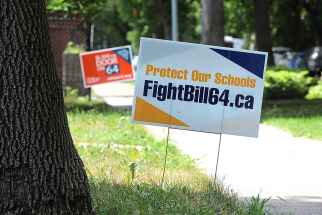Bill 64 dead, but stay tuned for its sequel
Read this article for free:
or
Already have an account? Log in here »
To continue reading, please subscribe:
Monthly Digital Subscription
$0 for the first 4 weeks*
- Enjoy unlimited reading on winnipegfreepress.com
- Read the E-Edition, our digital replica newspaper
- Access News Break, our award-winning app
- Play interactive puzzles
*No charge for 4 weeks then price increases to the regular rate of $19.00 plus GST every four weeks. Offer available to new and qualified returning subscribers only. Cancel any time.
Monthly Digital Subscription
$4.75/week*
- Enjoy unlimited reading on winnipegfreepress.com
- Read the E-Edition, our digital replica newspaper
- Access News Break, our award-winning app
- Play interactive puzzles
*Billed as $19 plus GST every four weeks. Cancel any time.
To continue reading, please subscribe:
Add Free Press access to your Brandon Sun subscription for only an additional
$1 for the first 4 weeks*
*Your next subscription payment will increase by $1.00 and you will be charged $16.99 plus GST for four weeks. After four weeks, your payment will increase to $23.99 plus GST every four weeks.
Read unlimited articles for free today:
or
Already have an account? Log in here »
Hey there, time traveller!
This article was published 19/08/2021 (1576 days ago), so information in it may no longer be current.
One of three things could happen to Manitoba’s controversial Bill 64, now that the perceived front-runner in the race to replace Premier Brian Pallister said she plans to scrap the proposed legislation: it could be substantially amended, withdrawn or quashed if the legislature is prorogued.
However, that doesn’t mean the idea of reducing the number of school divisions across the province is dead. Manitobans will probably see a scaled-down version of the bill sometime in 2022.

As anticipated, Bill 64, the Education Modernization Act, will never see the light of day as it’s currently written, now that Pallister has confirmed he’s quitting early in his second term. The bill was destined for the shredder even before leadership candidate Heather Stefanson, the MLA for Tuxedo, said Wednesday she would “kill” the bill if elected. It was dead the moment Pallister announced he was stepping down.
Bill 64 was a Pallister invention designed solely to put his stamp on the public school system. It was never grounded in sound education policy and has been widely rejected by Manitobans. In its current form, it could single-handedly sink the Tories in the next election. It’s that unpopular.
The Tories now find themselves in the unusual position of having a leadership candidate and most of caucus openly opposing a bill that’s still on the government order paper.
They have a few options on how to proceed.
Bill 64 was a Pallister invention designed solely to put his stamp on the public school system. It was never grounded in sound education policy and has been widely rejected by Manitobans. In its current form, it could single-handedly sink the Tories in the next election. It’s that unpopular.
The legislature was scheduled to resume sitting Oct. 6, but it doesn’t have to. The premier could delay it until after the Tories elect a new leader. If he does, the current session could proceed at a later date with the existing bills still in motion.
Regardless of when the session resumes, Education Minister Cliff Cullen could seek leave to withdraw Bill 64 (which has to occur by unanimous consent of the house). That would kill the bill in its tracks. He could also amend it, but that seems unlikely. The Tories would prefer to avoid the spectacle of the bill going to public hearings.

Government could prorogue the house, meaning the current session would end and all bills before the legislature, including Bill 64, would die on the order paper. That’s a real possibility. If that’s the route the Tories take, they could return with a new leader and a throne speech and decide which bills, if any, they want to resurrect.
Bill 64 would not be among them.
What the Tories will likely do is introduce a scaled-down version of the bill at a later date, probably next year. There are valid reasons for doing so.
With teacher bargaining moving to a centralized model and school property taxes being phased out, there are now fewer reasons than ever for the existence of school boards and elected trustees. There are also legitimate concerns about the amount of administrative duplication that exists under the current structure.
At the same time, there have been compelling arguments made since Bill 64 was introduced in favour of maintaining some elected representation in the public school system to reflect regional priorities.
The challenge for a new Tory leader will be to find a happy medium between the two. That will require listening to the concerns of Manitobans, something Pallister was not very good at.
The debate over school divisions goes back to at least the 1990s when the Norrie boundaries commission recommended substantially reducing the number of school boards across the province. The Filmon government at the time ultimately rejected those recommendations, opting instead for voluntary mergers. It wasn’t until the NDP won government in 1999 that consolidation was mandated for some divisions.
Bill 64 may be the single most unpopular policy the Pallister government has tried to push through since it was first elected in 2016. It’s why any new Tory leadership candidate has to come out strongly against it, even if they supported it in the past, as Stefanson did (she seconded the motion to introduce the bill last year).
Bill 64 may be dead, but there will almost certainly be a sequel to this story.
tom.brodbeck@freepress.mb.ca

Tom has been covering Manitoba politics since the early 1990s and joined the Winnipeg Free Press news team in 2019.
Our newsroom depends on a growing audience of readers to power our journalism. If you are not a paid reader, please consider becoming a subscriber.
Our newsroom depends on its audience of readers to power our journalism. Thank you for your support.








